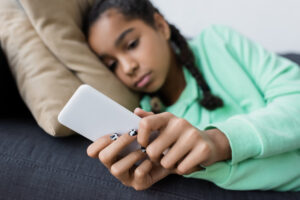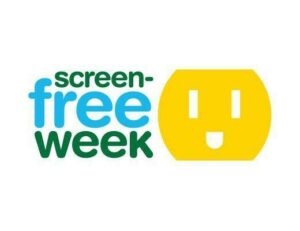It’s one of our very favorite quotes from writer Anne Lamott:
We all need to disconnect from time to time, to be fully present to ourselves and to others. It’s a simple form of self-care. It’s even more important for kids, especially when that unplugged time is given to the kind of free play they need to develop important life skills: imagination and empathy; creativity and emotional intelligence; communication and collaboration.
The list can – and does – go on.
While there are many reasons why free play opportunities have declined both at home and at school, one of the biggest impediments is simply too much screen time. Platforms are deliberately designed and managed to keep us scrolling, as anyone who’s lost an hour or two or more swiping from Reel to Reel or TikTok to TikTok can attest.
Screen-Free Week was designed as a counterpoint to all this, promoting opportunities for kids and their friends and families to engage in fun activities together, nurturing our connections with each other, untethered from electronic devices.
And it starts tomorrow.
“Being Off Facebook Was Positive”
These are all familiar themes to regular readers of this blog, and though it hasn’t been so long since we last discussed them, another development this past week compelled us to return to them once again: the release of Jean Twenge’s new book, Generations.

One of the most compelling new studies was led by Alexy Makarin, an Assistant Professor in the Applied Economics group at MIT. He and his team analyzed data from Facebook’s earliest years, when it was gradually rolled out among US colleges, along with data from a national survey of college students that was conducted around the same time and included questions on mental health. Facebook’s staggered rollout made it easier for the researchers to observe changes after its introduction. Altogether, they worked with data from more than 350,000 students at more than 300 colleges.
So what happened? “Almost immediately after Facebook arrives on campus, we see an uptick in mental health issues that students report,” Makarin says. “We especially find an impact on depression rates, anxiety disorders and other questions associated with depression in general.”
And the effect isn’t small, he says. Across the population, the rollout of Facebook caused about 2% of college students to become clinically depressed. That may sound modest, but with more than 17 million college students in the U.S. at the time, that means Facebook caused more than 300,000 young adults to suffer from depression.
For an individual, on average, engaging with Facebook decreases their mental health by roughly 22% of the effect of losing one’s job, as reported by a previous meta-analysis, Makarin and his team found.
According to some, Makarin’s is the best study we have to date, clearly showing that social media does have an impact. Meantime, other studies have shown that taking a break from social media improves mental well-being.
“Being off Facebook was positive across well-being outcomes,” [Stanford economist and study co-author Matthew Gentzkow] says [of his own research]. “You see higher happiness, life satisfaction, and also lower depression, lower anxiety, and maybe a little bit lower loneliness.”
Resources for Screen-Free Week 2023

Even though it’s about turning off screens, Screen-Free Week isn’t about going without – it’s about what you can get! An hour once dedicated to YouTube becomes an hour spent outside; ten minutes whiled away on social media turn into ten minutes spent doodling; a movie on a rainy afternoon is replaced by time spent reading, chatting, or playing pretend!
As usual, their website provides some excellent resources for families, teachers, and others to inspire you and help you get the most out of the event, as well as spread the word about it. There are also a lot of great tip sheets out there to help you get ideas for screen-free activities, such as
- 60+ Screen-Free Activities for Kids
- 100 Screen-Free Things to Do with Kids at Home
- 111 Screen-Free Activities for Screen-Free Week
And, of course, you’ll find ideas and inspiration here on our blog, as well – here and here and here, for instance.
So let’s have some fun this week! And the comments below to share how you and your kids, students, or clients are observing the event this year…






